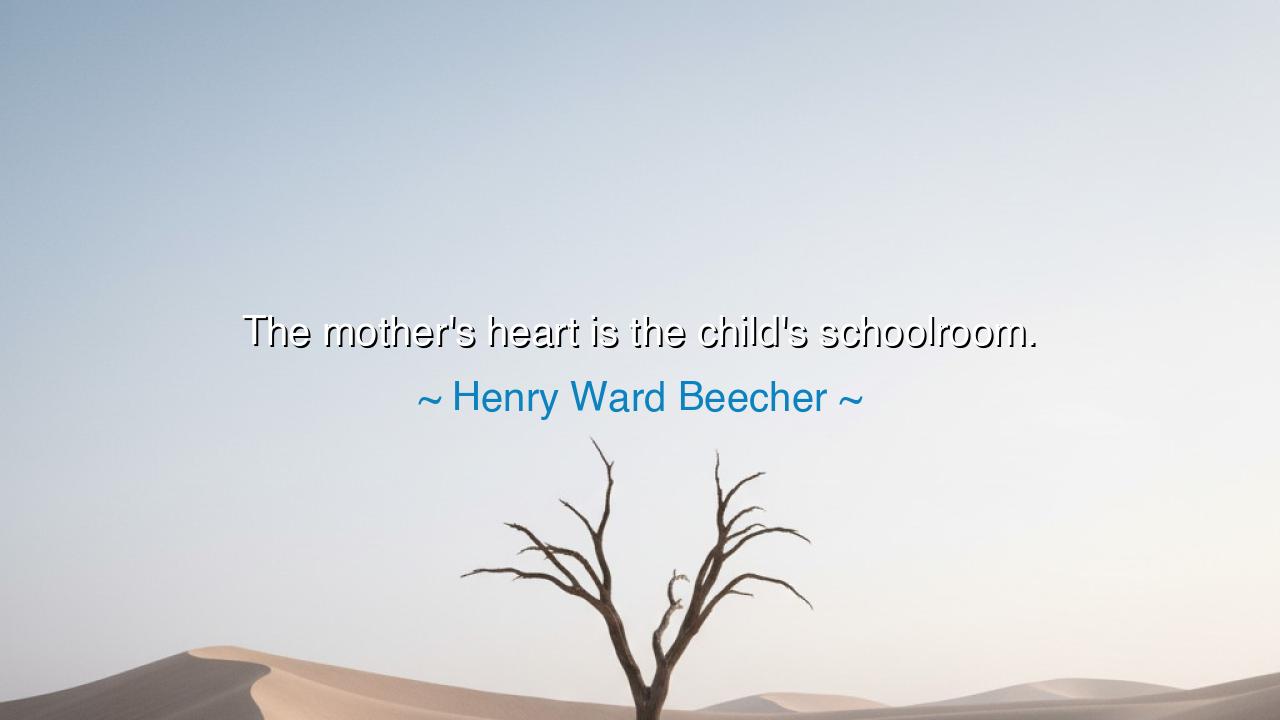
The mother's heart is the child's schoolroom.






In the tender and timeless words of Henry Ward Beecher, “The mother’s heart is the child’s schoolroom,” we find one of the most profound truths of human existence—that the first lessons a child ever learns are written not in books, but in love. The mother’s heart, with all its patience, compassion, and quiet endurance, is the sacred place where a soul takes its first shape. It is there that a child learns trust, kindness, courage, and faith. Beecher, one of America’s great preachers and moral voices of the 19th century, understood that true education begins long before formal schooling, in the unseen hours when a mother holds, comforts, and guides her child. In her voice, the child first hears the rhythm of language; in her gaze, the meaning of goodness; and in her embrace, the first lesson of the divine.
The origin of this quote lies in Beecher’s lifelong devotion to moral instruction and the sanctity of family. A clergyman, social reformer, and brother of the famed writer Harriet Beecher Stowe, he lived in an era when the home was seen as the cornerstone of civilization. To Beecher, the mother was not merely a caretaker—she was the moral compass of the family, the teacher of the soul. He saw her heart as the first and greatest classroom, where children absorb not facts, but virtues. The schoolroom of the heart, he believed, is where humanity is truly educated: where the child learns to love before it learns to reason, to forgive before it understands justice, and to hope before it has words for faith.
The ancients too knew that the heart of a mother was the first and most enduring teacher. The Greeks revered Metis, the goddess of wisdom and deep thought, as the mother of Athena—the goddess of reason and virtue. From this divine lineage, they understood that wisdom is born of nurturing love. In ancient Egypt, the goddess Isis, mother of Horus, was honored as the source of protection, learning, and spiritual strength. She was depicted teaching her son the ways of truth and justice, whispering divine secrets into his young ears. In every civilization, the image of the mother has stood as the first mentor of the human spirit, shaping not only the destiny of her children but the destiny of nations through them.
Consider the story of Susanna Wesley, mother of John and Charles Wesley, founders of the Methodist movement. In a humble home filled with noise and poverty, she raised nineteen children, teaching each one by hand and heart. Her days were spent in tireless labor, but every evening, she gathered her children to speak of God, of patience, of kindness, and of discipline. From her unwavering faith and wisdom sprang two men who would ignite a spiritual awakening that transformed the world. She had no grand pulpit, no title of power, but her schoolroom was her heart, and its lessons shaped generations. Her life is the living testament of Beecher’s truth: that the mother’s influence is the foundation upon which all learning, all virtue, and all greatness stand.
To say that “the mother’s heart is the child’s schoolroom” is also to say that the earliest lessons of life are felt, not taught. A mother who lives with gentleness teaches her child peace; one who faces hardship with courage teaches strength; one who forgives teaches compassion. These teachings are not spoken—they are lived. The child studies the mother’s every gesture, every silence, every act of kindness or fear. The mother becomes the mirror through which the child first perceives the world. If her heart is steady and loving, the child learns that the world is trustworthy; if her heart is wounded yet persevering, the child learns resilience and faith. Thus, the mother’s heart is not just a teacher—it is the living scripture of love itself.
Beecher’s words also remind us of a greater truth: that the education of the soul is the true purpose of life. Academic learning may sharpen the mind, but it is love that refines the character. In a world filled with information yet starving for empathy, Beecher’s wisdom calls us back to the beginning—to the sacred space of the home, where the seeds of virtue are sown. The mother’s influence is not limited to her children alone; through them, it ripples into the world, shaping the hearts and minds of future generations. For every act of kindness in humanity, every spark of conscience, there stands behind it the quiet labor of some mother’s heart.
Let this truth be handed down as a lesson for all generations: honor the teachers of the heart, for they are the architects of the soul. Mothers, know the sacredness of your calling; in your patience, your compassion, and your example, you write the lessons that will echo through eternity. And children—grown or young—never forget the heart that taught you how to love. Repay that love not only in gratitude but by living its virtues, by carrying its light into the world. For the greatest homage we can pay to those who taught us love is to become teachers of love ourselves.
Thus, in the immortal words of Henry Ward Beecher, we are reminded that every mother is both scholar and sage, every cradle a classroom, every heartbeat a lesson in grace. The mother’s heart is the first temple of learning, and its wisdom—the wisdom of love—outlasts empires and generations. For when all books are forgotten and all schools crumble, it is still love, taught by a mother’s heart, that guides humanity toward the light.






AAdministratorAdministrator
Welcome, honored guests. Please leave a comment, we will respond soon